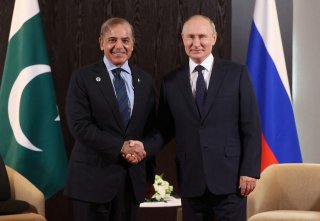Crisis-Ridden Pakistan Is Thirsty for Cheap Russian Oil
Pakistani finance minister Ishaq Dar announced on Wednesday that the country was seeking to purchase oil from Russia at a steep discount.
Pakistani finance minister Ishaq Dar announced on Wednesday that the country was seeking to purchase oil from Russia at a steep discount—a move that could help it from further depleting its disastrously low foreign reserves but would likely raise objections in the West, which has sought to cut off Russia’s international oil trade in the aftermath of its invasion of Ukraine.
“We’re definitely considering it,” Dar told a press conference on Wednesday, responding to a question about the proposed arrangement. In his remarks, the finance minister defended the proposed purchases, noting that Pakistan’s neighbor and regional arch-rival India had continued its imports throughout the Russian invasion of Ukraine: “If India is buying oil from Russia, we also have a right.”
In its attempts to import oil, Pakistan could benefit from a proposed price-capping mechanism on Russian oil, which would allow Russia to continue to produce oil at a slightly profitable price and drive international prices down but would constrain its revenues for the government and military. The cap’s value remains unspecified, but U.S. Treasury Secretary Janet Yellen had previously suggested approximately $60 per barrel, well below the current price point of $85 to $95 per barrel outside of Russia.
The push to import oil—one of Pakistan’s most expensive imports—from Russia comes two weeks after the Moody's credit agency cut Pakistan’s sovereign rating, a decision that Islamabad immediately contested. The lost rating makes it more difficult for Pakistan to borrow money, compounding the country’s existing financial crisis.
Pakistan is now thought to have only enough foreign reserves to cover one month of imports, according to Reuters. However, despite the country’s financial troubles, Dar insisted that Islamabad would not default on its debts or seek restructuring from the “Paris Club,” a group of major creditor nations. “We can, God willing, manage,” he said. “I assure you, you don’t need to worry.”
Pakistan’s strained economy was dealt an additional blow this summer after an unexpectedly harsh monsoon season swamped the country, killing more than 1,000 people and leaving as much as one-third of its land underwater. Pakistani economists estimated that the cost of the disaster would exceed $30 billion, a sum that the country cannot afford to pay.
Dar has served as Pakistan’s finance minister since September, acceding to the office after the abrupt resignation of his predecessor, Miftah Ismail. A veteran of Pakistani politics and a member of the ruling Pakistan Muslim League-Nawaz (PML-N) party, Dar had previously held the office from 1998 to 1999, again in 2008, and again from 2013 through 2017.
Trevor Filseth is a current and foreign affairs writer for the National Interest.
Image: Reuters.

